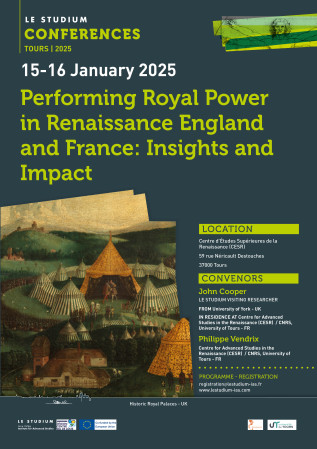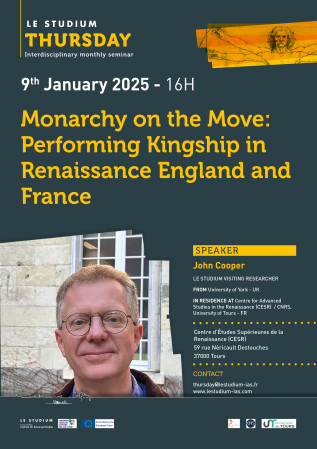John Cooper

From
In residence at
Centre for Advanced Studies in the Renaissance (CESR) / CNRS, University of Tours - FR
Host scientist
Philippe Vendrix
BIOGRAPHY
John Cooper is Professor of History at the University of York (UK), specialising in the political and religious history of sixteenth-century England and Ireland. He has published books on royal propaganda and the Elizabethan statesman Sir Francis Walsingham, and edited collections on the political culture of the Palace of Westminster and royal journeys in early modern Europe. Between 2013 and 2019 he led the ‘St Stephen’s Chapel, Westminster’ and ‘Listening to the Commons’ AHRC-funded projects, exploring the architectural and political history of the medieval royal chapel which became the first House of Commons. He is currently Co-Investigator of the AHRC project ‘Henry VIII on Tour’ (2022-25), exploring royal progresses, palaces and pageantry, and comparisons between England and France. John is Director of the Society of Antiquaries of London, and a Fellow of the Royal Historical Society.
PROJECT
Royal Journeys, Palaces and Pageantry in England and France 1460-1589: Establishing a Comparative and Multidisciplinary Methodology.
Why did the rulers of sixteenth-century England and France spend so much time on the road? This research project offers a parallel study of the royal journeys, called 'progresses' in English, undertaken by Henry VIII (ruled 1509-47) and Francois Ier (ruled 1515-47). Through travel around their kingdoms, kings and queens asserted their personal agency, dealt with rebellion, connected with local power-holders, and engaged in military display. But royal journeys were also culturally significant, bringing the magnificence of the royal court to communities far distant from London and Paris, and disseminating Renaissance tastes in architecture, music and drama. Over the past forty years, historians and art historians have reconstructed English and French royal splendour in vivid detail. This research project now tracks that pageantry as it went on tour, restoring the element of motion that was fundamental to Renaissance monarchy.
Henry VIII and Francois Ier had an intense personal rivalry, witnessed up close at the famous Field of Cloth of Gold in 1520. But they also had a deep affinity with each other. France was a strong influence on English royal protocol. Building on the findings of the UK research project 'Henry VIII on Tour' (2022-25), my research compares the journeys of Francois Ier - from the Ile de France to the Loire Valley, Picardy, Champagne and Brittany - to those of Henry VIII in terms of extent and scale, political and religious purpose, and impact on the regions that hosted them. What were the reactions of the people who saw their monarchs in the flesh, from celebration to dread? Did royal journeys enable queens to act independently of their husbands? How did music and liturgy accentuate the royal image on tour?


